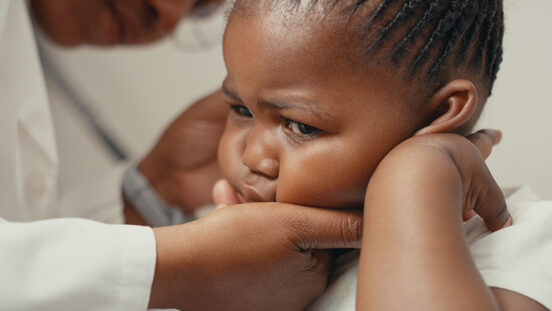Should we be teaching sexual consent to toddlers?
Expert advice from a sex education author.
In Australia, there is a growing focus on sexual consent education for all ages. The NSW Government is rolling out its first sexual assault program from kindergarten to Year 12 and many universities are encouraging students to complete an online course on sexual consent, Consent Matters.
But how early is too early? Sex ed expert and author, Row Murray, believes education about sexual consent should begin as early as toddlerhood.
"As soon as a child is in a position to start toilet training and have that first level of bodily autonomy, that's when to get cracking on teaching consent," says Row.
"This isn't about sexualising kids or even about teaching them about the birds and the bees. It's about teaching them about their bodies and letting them know that they are in charge of who touches them and where.
"One of the first ways we can teach a child that we honour their wishes is by not forcing them to hug or kiss relatives – or even their parents if they're not in the mood.
As soon as a child refuses or expresses a need to stop physical contact – whether it's hugs or tickles or any kind of play – adults should immediately stop.
This will demonstrate to the child that they are in charge of their body and they have full bodily autonomy."
Row has the following age-appropriate tips for teaching sexual consent – what it is, how you give it, and how to be sure you have it – to toddlerhood through to adulthood.

Teach your child options, like 'Do you want to hello, high-five or hug grandma?'
Preschoolers: 3-5 years
• Sex education for preschoolers really has nothing to do with sex, but is about their bodies, consent, hygiene, and safety. Age-appropriate is the key thing here, so don't overthink it or worry!
• You can start teaching consent now, by being consistent about teaching them to ask their friends for permission before embracing or kissing a playmate. Saying 'hug or high-five?' is a great way to start.
• Use the correct terms for genitalia, as it avoids awkward back-stepping when they're older.
• Don't make them be intimate with people and making them kiss grandma falls into this category! Teaching them some options, like 'Do you want to hello, high-five or hug grandma?', is a simple and easy-to-remember way to do this.
• Kids this age have short attention spans, so be prepared to be consistent as you teach them consent.

Primary school children need to learn about digital consent.
Primary school age: 5-10 years
• Teach your kids that 'stop' and 'no' are important words that are ok to use, and reinforce this teaching by respecting them when they say it themselves. This can be fun, like having a tickling game where they can call the start and finish!
• You can start to teach them about reading facial expressions and body language in the context of consent, as consent is communicated in a range of ways.
• Don't judge them while they're learning about consent, as this is a time when they learn that it's safe, and ok, to come to you for help and advice.
• Give them the chance to say 'yes' and 'no' in day to day life, such as choosing food while out, or getting dressed. They're old enough now to not want to wear swimmers in the dead of winter!
• At this age, kids are online a lot, and need to learn about digital consent – bullying, sharing photos and sending unsolicited rude message all need to be discussed.

Keep the lines of communication open and answer your teen's consent questions calmly.
Tweens & Teens: 10-19 years
• This age group will be in the thick of it – body changes, heavy amounts of time spent online, the start of sexual activity and first partners. Keep the lines of communication open and answer their consent questions calmly.
• Discuss what consent means to them. This is a great opportunity to find out for yourself where they're at, and where the knowledge gaps are.
• Set them up with a small group of other trusted adults (such as close relatives or older cousins, or trusted older friends) who they can safely talk to about life, love and sex. Sometimes they won't want to speak teen-to-parent and that's ok, as this is a part of learning boundaries and consent.
• Teach them about condoms and safer sex consent. For example, stealthing is a term used to describe consensual sex that starts with the condom on, then one party slips it off without their partner's consent. It happens, and they need to know this, and that it's not ok.
• They can have their own Medicare card from the age of 15, so arrange this (or even better, get them to fill out and lodge their own form). It gives them a great sense of medical consent and responsibility for their own body.
• Sending unsolicited nudes, or sharing nudes without consent, is a major breach of consent (and they can get into legal trouble here). This is a key thing to teach them.




